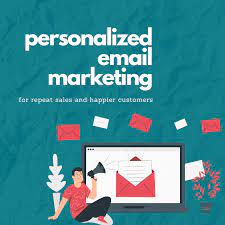In today’s digital age, email marketing has become an integral part of every business’s marketing strategy. However, sending out generic and impersonal emails can no longer cut it. Customers today expect personalized and relevant communication, which can help their buying decisions. Personalization in email marketing is the key to increase customer engagement and drive sales growth.
What is Personalization in Email Marketing?
Personalization in email marketing refers to tailoring the content of the emails to the individual preferences and behaviors of the recipients. It can include addressing the recipients by name or sending promotions or recommendations based on their past purchases or interests. Advanced personalization techniques now include dynamic content, which changes based on the subscriber’s behavior, location, or time zone.
Why is Personalization in Email Marketing Important?
Personalization in email marketing is important for several reasons.
1. Better Engagement and Relation with the Customers
Personalized emails show that a business has taken the time to understand their audience, and they value their preferences and needs. This builds trust and a feeling of connection with customers. According to a report by Epsilon, personalized emails generate a 29% higher open rate and a 41% higher click-through rate than generic emails.
2. Increased Sales and Conversions
Personalized emails have a more significant impact on customers’ purchase decisions. A study by Experian found that personalized product recommendations in emails had 8 times higher click rates than non-personalized recommendations. With personalization, businesses can provide customized offers, promote relevant products, or send exclusive discounts, leading to an increase in sales and conversions.
3. Reduced Email Fatigue and Unsubscribe Rates
Sending relevant and personalized emails can help businesses avoid triggering email fatigue among the recipients, leading to high unsubscribe rates. When customers continuously receive irrelevant and generic emails, they lose interest and opt-out. Personalization can help prevent that.
How to Personalize Emails?
Personalization in email marketing can be achieved in several ways, including:
1. Personalized Subject Lines
Including the recipient’s name or other personal information in the subject line can increase the likelihood of them opening the email.
2. Segmented Audience Lists
Grouping subscribers based on their demographic, purchasing behavior, or location can help create tailored emails for each group.
3. Dynamic Content
Using dynamic content, such as images or promotions, that change based on the recipient’s behavior or interests, can increase the relevancy of the emails.
4. Personalized Recommendations
Using past purchasing data to recommend personalized products or services can increase the probability of conversion.
Conclusion
In conclusion, personalization in email marketing is no longer optional. A personalized approach can have a significant impact on a business’s relationship with its customers, engagement levels, and sales growth. By using advanced personalization techniques, businesses can reach their customers in a more meaningful and relevant way. Embracing personalization in email marketing can take a business to the next level of marketing and customer engagement.
FAQs (Frequently Asked Questions)
No. Personalization refers to tailoring the content of emails to individual preferences and behaviors of the recipients, whereas automation in email marketing refers to automating the process of sending emails based on a set of predetermined rules.
Yes. Personalization requires using customer data, such as past purchases, browsing behavior, or location, to provide tailored emails.
Yes. Using too much personalization in email marketing, such as referring to personal information that was not provided by the customer, can be perceived as intrusive.
The frequency of personalized emails should depend on the preferences and behavior of each customer. Sending too many or too few personalized emails can lead to poor engagement and unsubscribes.
Personalization in email marketing can lead to improved customer loyalty, reduced marketing costs, and increased brand reputation.


